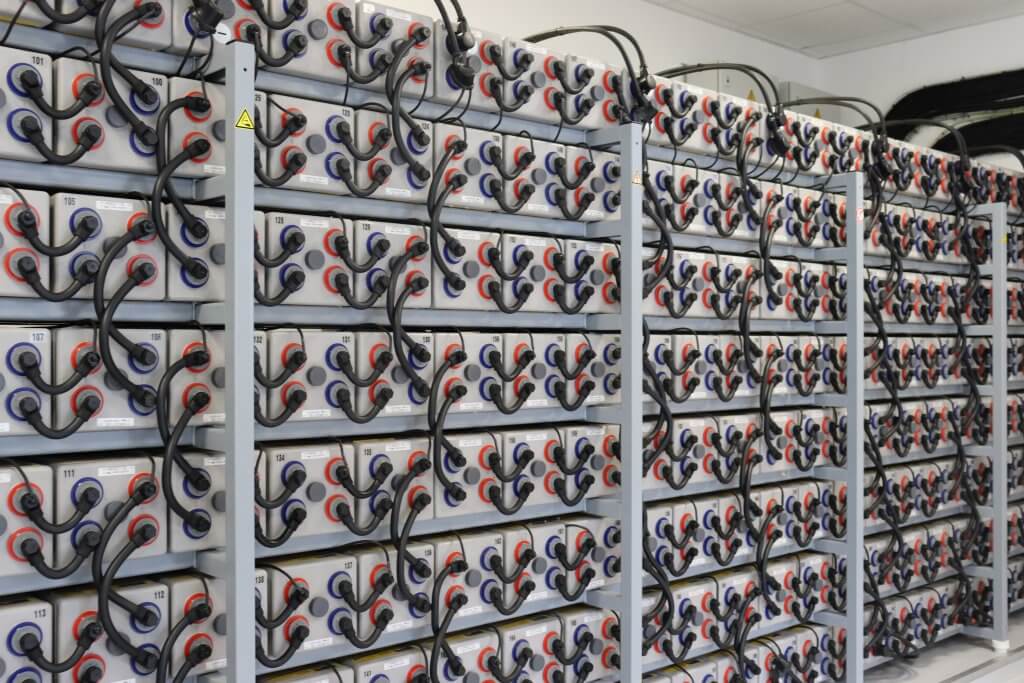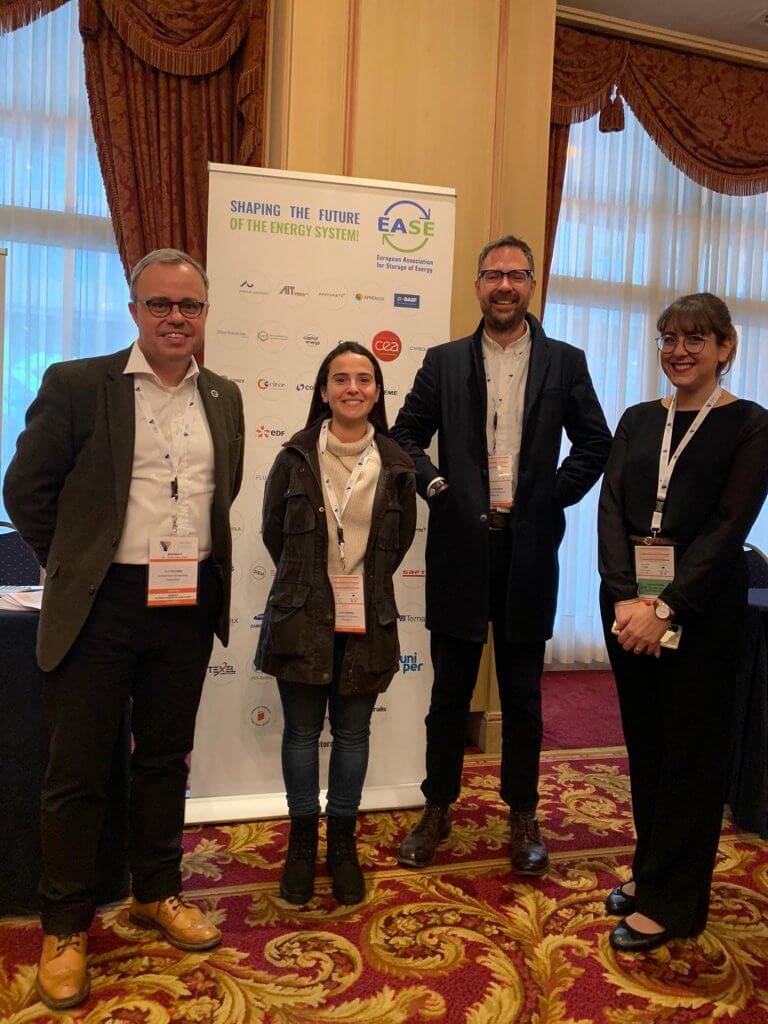

The CBI team visited Castanheira do Ribatejo, in Portugal, to meet with Exide Technologies and to find out more about its facilities.
Exide operates two state-of-the-art solar installations at its battery production (in Castanheira do Ribatejo) and battery recycling facilities (in Azambuja), using lead batteries (see our case study here).
José Barreiros (Director Product Development Industrial EMEA at Exide) explained how it works in detail:
« We have a combined capacity of 4.5 MWp, with overall 11.250 solar panels installed. This is enough energy to supply more than 1.500 households. With these solar parks, we have reduced the carbon emission by more than 20% across both sites.
In our production plant, the PV installation is combined with our own battery energy storage system (BESS). It contains 70 inverters and 290 Sonnenschein Solar battery cells, with an available stored energy of around 500kWh. The battery storage system is part of a ‘Green Social Building’. It operates as an island for the factory workers, where the solar panels provide energy during the day and the batteries provide power at night ».

The type of lead batteries used in this Battey Energy Storage System (BESS) are Exide’s very own Sonnenschein Solar gel batteries. This battery range « has been used in complex, large-scale network power applications across the world for many decades », José continued:
« With their proven reliability, maintenance-free and first-class safety features, gel batteries offer a long service life and protection against deep discharge. Also, since lead batteries are fully recyclable at the end-of-life, our Sonnenschein Solar range provides added sustainability for renewable energy storage applications ».
For CBI, energy storage applications utilising battery technology is an increasingly important market-key to help governments around the world meet future electrification and decarbonisation targets and Exide’s Product Development Director agrees:
« As a global player of battery and energy systems, Exide Technologies is in prime position to inspire today’s and tomorrow’s generations with smart energy storage solutions, as we recognize the need to both preserve and energize the world. Exide Technologies offers smart energy storage solutions to support the transition from fossil energy to renewable energy sources. We focus on storage systems and solutions for greenhouse gas reduction and the optimization of TCO in energy-intensive industries.
Our energy storage solutions will enable businesses to become ‘greener’, more productive and in control of their energy usage and costs ».
Another benefit of this project is its unique and innovative Battery Management System (BMS) for lead batteries:
«Our installation is utilizing the battery management system to control the voltage of each cell and the temperature on each string, via four probes, assuring a tight control of the depth of discharge and charge on each string.
Taking into consideration that the battery operates on one cycle per day, this will allow deeper control of the state of health of the cells and act as soon as needed. It also predicts the available energy of the system depending on the power», concluded José.
This installation is one of many worldwide energy storage systems using lead batteries. If you’re interested in more projects like this one, please explore our Interactive Map.
As part of CBI’s technical team, we’ve recently welcomed Begüm Bozkaya. With a BSc degree in Chemistry from the Middle East Technical University and an MSc degree in Materials Science from the Technical University of Munich, she gained extensive knowledge on the effects of carbon additives on negative plates for lead batteries, after using this as a Ph.D. research topic.
After working on several industrial projects for the past 6 years, Begüm joined CBI to gain a broader perspective on lead battery research as her role involves directly working with CBI’s global members from different companies and stages of the supply chain. She will be managing all of CBI’s European Technical projects as well as supporting CBI’s standards program.
According to her, CBI is doing what no one else in the industry is by “combining the knowledge from the industry and research institutes and collecting them in a non-competitive environment”. This means it’s possible to pool knowledge from a range of battery experts in order to advance lead battery technology for all applications, from energy storage systems to automotive.
As part of CBI’s team based in Europe, it is also important to look at the role of EU industry-research-academia partnerships in driving innovation. “We need to strongly defend the place of lead batteries. This is a well-established technology: we are cost-effective, recyclable, we have innovative research initiatives underway, and we’re committed to contributing to a cleaner future in the energy sector, especially to facilitate decarbonisation and support climate goals. It is vital that the EU includes all batteries in their future work plans”.
In that sense, the work developed by CBI through its Technical Roadmap has been essential to collect relevant information for lead battery applications and to help educate the audience regarding the future of this technology that has an enormous potential:
“If we can open new research topics and innovative ideas that can cover what we have in the roadmap, I’m sure lead batteries can still be considered a key player in the efforts to decarbonise, and developed further as a result. Research is the key point.”

When mentioning the new year and the developments that we can expect from advanced lead batteries, Bozkaya said that bipolar or advanced PbC batteries “can bring new research topics” for the industry and that these are “great candidates for EU initiatives”:
“There’s a bright future for advanced lead batteries and a lot of great research projects being developed as a result of CBI’s work, so I believe that in the near future we will be able to show even more how committed the industry is to Europe’s climate goals and, therefore be more involved with EU initiatives through lead battery research projects”.
For more information on CBI’s innovative technical program, click here.
The 4th edition of EASE’s Energy Storage Global Conference took place last week (19 – 21 October) in Brussels and online. With the support of the European Commission, the event provided three days of talks and discussions around the future of energy storage, its current market, policy frameworks and the latest trends in technology.
For the opening session, Maroš Šefčovič, Vice-President of the European Commission for Interinstitutional Relations and Foresight, spoke about the key role of energy storage and batteries to achieve climate neutrality by 2050, while highlighting its increasing demand to answer the new targets for renewable energy and carbon emission standards.
Šefčovič mentioned the importance of innovation and competition to keep investing in current technologies, improving performance and using advanced materials: “Europe must invest, not only in improving existing solutions but also in developing next generation breakthrough technologies”.
EASE’s President, David Post, also predicted battery storage of 7.7TWh by 2030 and highlighted the importance of supporting all technologies.
The last day of the conference was focused on discovering the latest cutting-edge energy storage technologies and CBI’s Research and Innovation Manager, Dr Carl Telford, spoke in a session dedicated to “Electrochemical and Electrical Energy Storage”, presenting the work that CBI has been developing through research and innovation for advanced lead batteries.

CBI's 2021 Technical Roadmap was presented to illustrate how constant performance improvement and technological advances can create limitless opportunities for the lead battery industry to help achieve global electrification and decarbonization targets.
While navigating through Europe’s funding landscape and showcasing European energy storage case studies using lead batteries (with Exide Group and Systems Sunlight SA), Dr Telford explained the challenges that the industry might face when applying through a “very complex” funding system, but also concluded with an optimistic note on the amount of opportunities that exist for energy storage and batteries in terms of public funding, proving that these are indeed necessary for the future:
“When considering the EU’s high-level goals, the speed of action required to mitigate the climate crisis, it is crucial that all energy storage solutions are not only available for deployment, but also encouraged”.

On October 4, CBI brought together a digital panel to discuss the critical role of batteries for Europe’s sustainable transition. As part of Europe's Sustainable Energy Week, supported by the EU Commission, the virtual event provided an open discussion around the importance of a level playing field amongst technologies in Europe and featured European case studies where advanced lead batteries are providing reliable, recyclable and safe energy storage.
CBI’s Research and Innovation Manager, Dr Carl Telford, opened the event by showcasing our recently launched Technical Roadmap, to illustrate that “sustainable economies need batteries”. If policy makers want to solve the problems of climate change and pollution, while moving from a linear to a circular economy, then industries will “need a proper deployment of battery technologies and energy storage”, and this is where Europe’s lead battery industry plays a key role.
From Exide Europe, Holger Fricke, Director Basic Research R&D EMEA, presented the benefits of Exide’s “on-site solar installation in Portugal”, that combines lead battery energy storage with renewable energy. Carbon emissions were reduced by more than 20% and energy management was improved, turning this case study into a real-world example of decarbonisation, with the installation facilities now being used as a showcase.
Peter Stevenson, Senior Technical Co-ordinator at GS Yuasa, joined the event to discuss the importance of hybrid solutions for Europe’s sustainable energy future. Using an example of the “world’s first container of dual chemistry energy storage system”, he highlighted the “complementarity and flexibility” between lead and lithium battery technologies.
While moderating the panel, Patrick Clerens, Secretary-General at EASE, reflected on the need of a level playing field between different technologies and stated that “no one can pick a technology winner”. Europe needs more batteries and new battery technologies, including hybrid ones, and through this it is possible to have “the best of both worlds”.

There are already some EU industrial and research initiatives going on to demonstrate how batteries can work together to reach the energy demands, such as the European Battery Alliance, Batteries Europe, Batteries 2030+ or IPCEI's. However, it remains important to share the message that a wide array of energy storage and battery technologies are needed to address the flexibility requirements and support the energy transition and the EU green goals, including lead batteries.
By the end of the discussion, it was clear that other industries can learn from the lead battery experience since it’s a well-established industry that represents a major example of circularity in Europe. Through research and innovation, enhancing the performance of lead-based technologies will be essential for Europe’s sustainable energy future and create further opportunities for synergies with other chemistries.
Watch the video of the event:
Download the presentations from the event below: